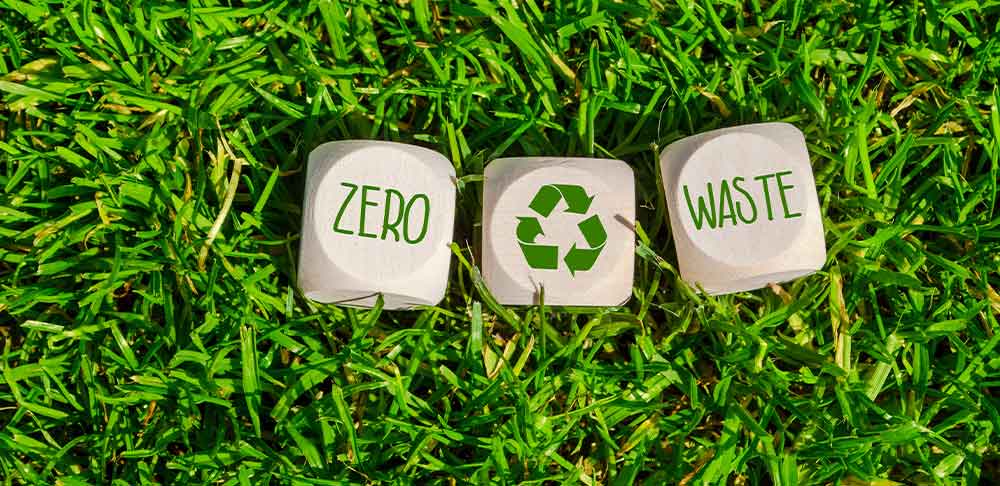DLF Cybercity Hyderabad: India's First Workplace to Achieve USGBC LEED Zero Waste Certification

Introduction
In today's fast-paced world, as we witness the undeniable progress and growth in various industries, one pressing concern that demands our immediate attention is the management of waste. Fortunately, over the last decade, many experts from diverse fields have come forward to introduce an ingenious solution for the management of this waste in a manner that is not only not hazardous to the environment, but rather proactively benefits it. This is called sustainable waste management, which is essentially a strategy of collecting, transporting, or disposing of waste in a manner that reduces the net amount of resources used, reusing material as much as possible, and creating minimal waste.
Amid the myriad sectors that shape the world we live in, the real estate industry plays a crucial role, but it also has a significant impact on the environment. As urbanisation and construction projects continue to grow, so does the generation of construction and demolition waste. With approximately half of the resources extracted going into the built environment and one-third of the waste generated by the construction industry, it is no wonder that the real estate industry is facing increasing pressure to adopt sustainable waste management strategies.
DLF Cybercity Hyderabad: Pioneering Sustainable Waste Management
The pursuit of sustainable practices and eco-friendly initiatives is becoming increasingly vital in today's world. The DLF Cybercity Hyderabad, for instance, has established a unique precedent by being the nation's first workplace awarded the US Green Building Council's (USGBC) LEED Zero Waste Certification. This honour emphasises DLF Cybercity's dedication to waste minimization, environmental preservation, and ethical business practises.
Located in the heart of the City of Pearls business district, DLF Cybercity Hyderabad is a sprawling office space that is available for lease and currently houses a diverse range of multinational companies and organisations. Well-known for its contemporary design, cutting-edge infrastructure, and, as of late, dedication to sustainability, DLF Cybercity Hyderabad is now at the forefront of India's green building revolution thanks to its achievement of the USGBC LEED Zero Waste Certification.
DLF Cybercity's journey towards achieving USGBC LEED Zero Waste Certification involved a comprehensive and collaborative effort involving various stakeholders, including building management, tenants, and waste management partners.
However, before diving into the intricacies of the impact this certification has had on the real estate industry, let us first briefly understand what USGBC LEED Zero Waste Certification entails.
The USGBC LEED (Leadership in Energy and Environmental Design) Zero Waste Certification is a globally recognised standard for measuring and recognising outstanding efforts in waste reduction, reuse, and recycling. The certification signifies that a building or workplace has diverted at least 90% of its waste from landfills, incineration, or the environment. By attaining this certification, DLF Cybercity has demonstrated its dedication to environmental responsibility and resource efficiency.
Impact on the Future of Sustainable Workplaces
The achievement of USGBC LEED Zero Waste Certification by DLF Cybercity has set a precedent for other commercial complexes, businesses, and organisations across India. It sends a powerful message that sustainable practices are achievable and economically viable. Some of the potential impacts on the future of sustainable workplaces include:
- Inspiration for Others:
As the largest publicly listed real estate company in India, DLF recognises the responsibility it has towards delivering a built environment ecosystem that not only exceeds end customer's expectations but is also environmentally responsible. Owing to its stature as a pioneer in the Indian real estate market, DLF Cybercity's success will undoubtedly inspire other companies and organisations to adopt eco-friendly practises and work towards similar certifications, creating a ripple effect for positive change.
- Green Building Momentum:
According to USGBCs annual report India accounts for 2.8 million gross square meters of green built spaces. LEED Zero Waste Certification, with its innate philosophy being based on the principle of the 3 Rs (reduce, reuse, and recycle), catalyses the green building movement in India. It reinforces the importance of eco-friendly design, construction, and operations, leading to increased adoption of green building standards across the country.
- Corporate Social Responsibility:
The business world is becoming more environmentally and socially responsible, in part due to growing stakeholders' expectations. This is evident in a report published by Aflac stating that 73% of investors actively look for businesses that are environmentally and socially responsible. Further, the same report highlights how 77% of consumers are more likely to use brands committed to making the world a better place. This has led to organisations now recognising that sustainability is not just a moral responsibility but also a key component of their corporate social responsibility (CSR) initiatives. By investing in green practises, companies can enhance their reputation and build a positive brand image.
- Environmental Conservation:
Global net emissions of carbon dioxide (CO2) from human activity must decrease by around 45 percent from 2010 levels by 2030 and must approach net zero around 2050 to avoid the worst climatic effects, according to the international consensus of scientists. With the built environment generating 40% of annual global CO2 emissions, real estate companies must play their part if we are to meet the net zero goal.
Sustainable waste management can play an integral role in minimising our global footprint, as it means reducing the utilisation of new resources, which in turn reduces fossil fuel-intensive activities and leaves more of the limited resources for future generations. With DLF Cybercity leading the way, a considerable reduction in landfill waste and greenhouse gas emissions can be expected. This contributes to broader environmental conservation efforts and mitigates the impact of climate change.
Final Thoughts
DLF Cybercity Hyderabad USGBC LEED Zero Waste Certification achievement is a momentous milestone in India's sustainable development journey. By demonstrating leadership in waste reduction and resource efficiency, DLF Cybercity Hyderabad has set a remarkable example for other workplaces to follow. As more companies and organisations adopt eco-friendly practices, we move closer to a greener and more sustainable future, fostering a healthier planet for future generations.

